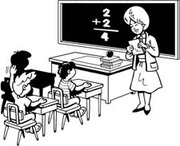Shells of Generalization
Generalization
Generalization means to be able to apply what is learned in one setting to another setting.
IDEA
The courts have determined that in order to receive an appropriate education under the IDEA, a child must make meaningful educational progress. One measure of such progress is the ability to generalize. In other words, if a child cannot apply what is learned in school, what has been accomplished? Clearly, the purpose of any education is to prepare the pupil for success in settings outside of school.
Generalization is all about taking what is learned in school and applying it to your life. In the area of reading this is an interesting concept. We can think about taking what we read to our lives, or about the strategies that help us to read, or about what we learn about when we read and apply those to our lives.
In the area of generalization it is important to realize that if a student is being taught the life skill of grocery shopping, then the student needs to be taken to different types of grocery stores rather than just one store. For reading what could be done is a student could be introduced to many books, or they could be given a story to read and they could be shown different aspects of it.
More on Generalization Related to Reading
In the area of spelling a student needs a lot of experiences as well. If a student is learning to write his or her name, then the student should be provided with the opportunity to write this name in different places and on different types of materials.
In learning how to use a dictionary a student needs to use the dictionary in book form, but the dictionary online as well. There are also so many dictionaries, so students should be given the opportunity to use dictionaries other than Webster. They also should be given the chance to look up words with more than one letter.
Sometimes generalization is carried out by instructing a student at home so that he or she is able to relate what is learned to home life.
Generalization in Reading
In reading generalization can be done by using various reading materials. For example, if a student is being shown how to use a telephone book, then the teacher could use a variety of different telephone books, either of different versions or from different companies, or from different cities. Another thing that could be done in the area of generalization in reading is to have students read items on bottles. A student could read a medicine bottle instructions. If this is done it is important for teachers to make sure that the student is exposed to many different types of medicine bottles. This will provide the student with experiences with other words and medicinal instructions that he might one day confront and need to know about.
In writing, if a student is being shown how to generalize, students could be provided different related writing experiences. For example, the student could learn new words and then use the words in speech, but also use it in writing and in as many ways as possible. The student could say the word, read it, write it, and so forth. Any way that the student can make the connection with the word counts and serves as a good reminder.
When learning the alphabet a student can learn how to write the same word in water, sand, on paper, with clay, candy, and so forth. These experiences will help the student to make the connection with the word and will help to foster retention of the material that has been learned.


